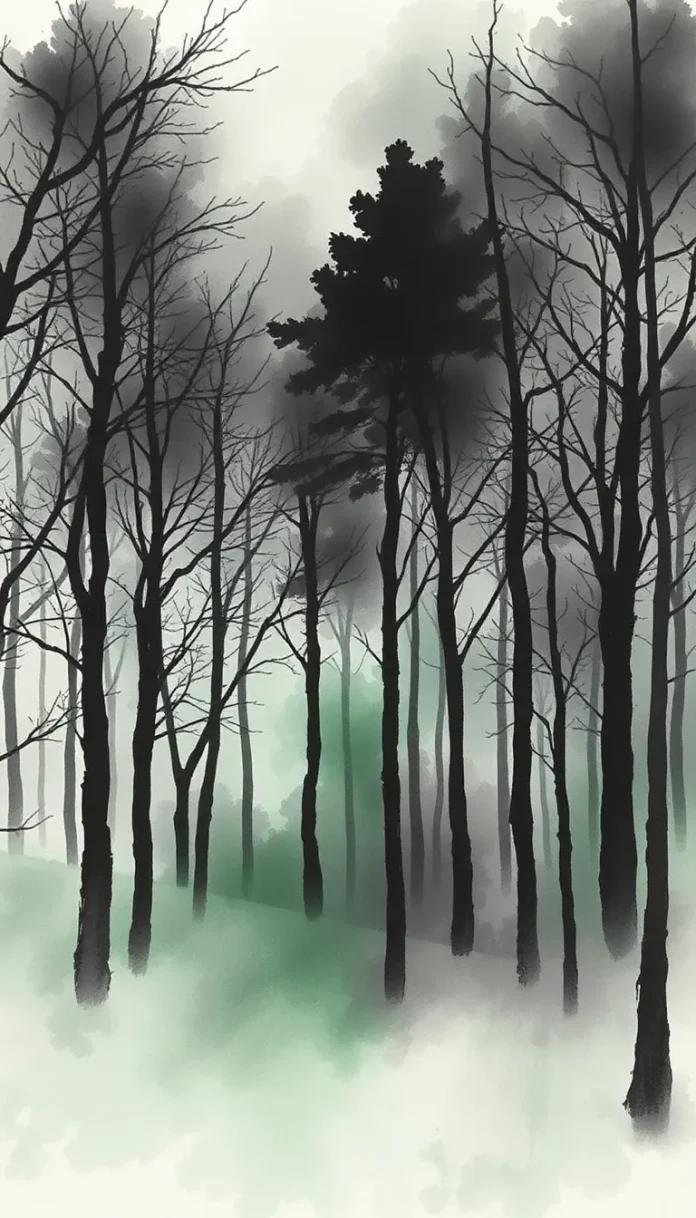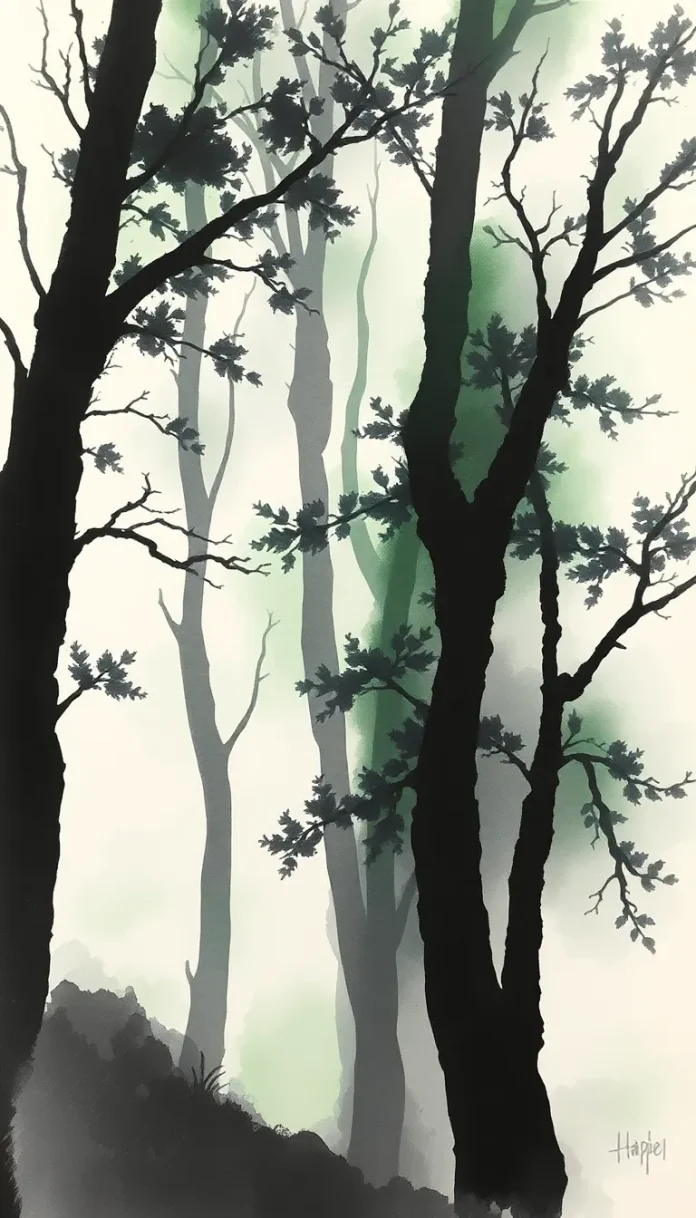Chronicles of the Forgotten Attic
I.
There, amid the labyrinth of forgotten treasures,
he wandered—a gentle soul with eyes of reflective sorrow.
A man draped in memories, his heart a tapestry of yearning,
each thread woven with the silken strands of nostalgia and impermanence.
“Here perchance,” he mused, “lies the vibrant tapestry of lives once lived,
each delicate fiber a testament to hope, sorrow, and the fleeting laughter of youth.”
For the Conservator, every delicate scraps of stained cloth,
every brittle letter penned in a hand now stilled by time,
spoke of those who had trod the earth with dreams aloft;
their tender whispers echoed in the silent corridors
of this mysterious attic—a repository of tender despair, of love lost to the inevitable passage of hours.
II.
Through gossamer drapes of ancient lace and threadbare shawls,
he traced the contours of forgotten existence.
In the creak of wooden floorboards and the soft sigh of antiquity,
he heard the murmurs of a life’s memoir, a legacy nurtured in the hidden corners
of this venerable space. The Conservator’s fingers caressed an embroidered handkerchief,
fragile as a sigh, pondering:
“Whence came this artistry, this delicate script of human endeavor?
What stories, what secret tragedies, are woven into the very substance
of this ancient fabric—half-remembered dreams spun into thread?”
III.
Under a vault of forgotten moments, he discovered a chest,
ornate with the faded sigils of time’s own design, and within it,
bundles of old diaries and letters penned in the ink of a vanished era.
A quiet dialogue began in his mind—a reverie in the language of sorrow:
“You are the silent seers of yesteryears; let us speak
through the broken lexicon of memory.”
Thus, in the solitude of this attic, the Conservator became both listener and speaker,
our quiet chronicler unlocking the vaults of a collective past.
a gentle murmur drifted through the room,
as if the very dust conspired to recall some ancient cadence,
and in the language of relics and latent emotions,
the Conservator began to discern not mere records, but the inner voices
of lives shadowed by both loss and irrevocable beauty.
IV.
The attic, a canvas upon which time had painted,
revealed portraits of hopeful youth and withered despair,
images captured like shadows at twilight—a bittersweet allegory.
In a threadbare portrait, gazing with sorrowful eyes, a young woman,
her expression a blend of resilience and longing, seemed to speak
directly to the Conservator’s soul. “Remember me,” she implored silently,
echoing the eternal requiem of a heart caught between joy and suffering.
Thus began his journey—a dialogue not only with relics, but with the transient nature
of his own being, a meditation on what it means to both possess and lose.
V.
Amid the scattered relics he carefully restored and tenderly arranged,
the Conservator’s inner voice echoed with memories of his own past;
quiet evenings by the hearth, voices of loved ones now mere echoes,
and the perpetual ache of time slipping through one’s fingers.
In the solitude of his spectral conversation with the relics,
he recalled the bittersweet refrain of each mortal life:
“Are we not but ephemeral stitches in an endless, grand tapestry,
each moment inscribed like runes upon the fabric of existence,
a memory that defies oblivion even as the world around us decays?”
And so he whispered to the silent witnesses of forgotten eras,
his words a gentle benediction free from the vestiges of ritual,
for in the quiet majesty of the attic he found a sanctuary—a repository
of courage, despair, renewal. “Do not fade away,” he urged,
“for each soul preserved in these gentle traces is a beacon against the night.”
VI.
In those solemn hours, as the twilight deepened and shadows merged
with the ghostly echoes of remembered time, a soft knock echoed
against the wooden paneling of his inner habitat. It was as if the very air,
heavy with the scent of aged parchment and wilted roses,
had awakened from a deep slumber to speak. “Who calls upon the gates
of memory?” he inquired in a hushed tone, as though mere sound might disturb
the sanctity of the past. In response, an unseen voice answered—a melody
of distant thunder and gentle wind chimes that stirred the heart’s dormant chambers.
The Conservator listened intently, for it was not a call to the living but
an invocation of those who had once been—voices long woven into the tapestry
of the attic’s fabric, each thread a testament to moments long surrendered to time.
In this communion, he found solace and melancholy entwined, a bittersweet harmony
that spoke of lives both fulfilled and undone.
VII.
With each relic tenderly unearthed and every fragile memory revived,
the Conservator’s inner monologue grew richer in its cadence.
He recounted to an invisible confidant the tales that were his own,
the silent sorrows of a childhood spent amid the pages of lost lore,
of a youth wandering in search of a forgotten identity.
“My life,” he murmured, “is entwined with these relics, as each
piece of timeless fabric carries a fragment of the soul’s odyssey.
Amid these relics, I find a reflection of my longings,
a mirror to the collective anguish and hope that bind us all
in an unspoken fraternity of memory and regret.”
Thus, in this evocative union of past and present, the Conservator
became both archivist and poetic sojourner, tracing the intricate paths
of a lineage etched in sorrow and splendor.
VIII.
A dialogue emerged among the relics:
an ancient embroidered handkerchief and a brittle letter shared a soft confabulation,
their voices mingling in the settled dust.
“Each of us,” they seemed to whisper, “bears witness to a truth
beyond the mere passage of years—a truth in which the tender ache of remembrance
occupies a hallowed space within the human heart.”
And so the Conservator, with trembling hands and a heart full of delicate lament,
addressed the relics as if they were living beings:
“Let us not surrender to oblivion. Within each of you, the eternal spirit
of memory lies preserved. Speak to me, and I shall transcribe your silent verses
into the annals of our shared heritage—a testament to the beauty and sorrow
of lives that flickered then vanished, yet continue to shimmer in the endless twilight.”
IX.
In the hours that followed, as dusk melted into the deep blue of a night unadorned,
he became an oracle, a silent mediator between the present and the past.
The attic itself, resplendent in its melancholic repose,
seemed to shudder with half-remembered laughter and whispered regrets.
A battered portrait now hung on a slanted beam; the eyes of its subject,
though lifeless to the mortal view, sparkled with an inner light.
He paused, a single tear tracing the path of solitude down his cheek,
and addressed the silent figure, as if she were a beloved friend:
“Tell me, dear spirit, of the joys you once embraced when light crowned the morn,
of the sorrows you concealed beneath gentler smiles, of the dreams
that unfurled beneath the canopy of stars, now scattered like the fragments
of this aged parchment. Speak, so that I might honor your memory
with the tender script of my own soul.”
Her silence, laden with the weight of a thousand unspoken soliloquies,
spoke volumes—an eloquent silence that resonated in the most profound depths
of human experience. It was the quiet language of longing, an unyielding cry
for remembrance that tethered the ephemeral to the infinite.
X.
Days turned languidly into nights, each breath of time embroidered
with the touch of ancient hands. In that venerable attic, the Conservator’s
task transcended the simple preservation of relics—it became a delicate art,
an opus longer than any mortal chronicle, as he catalogued the nuanced interplay
of absence and vitality, twilight and dawn, grief and unyielding hope.
Within a bundle of yellowed letters, he discovered recalling echoes of a family tale:
a narrative of bright summer afternoons, of secret gardens lost to the relentless tide
of modernity, of laughter carried away by the winds of destiny. “How wondrously
the heart holds onto what it cherishes,” he whispered,
as if in reverence toward a spirit too delicate for the confines of time.
Each word was an echo, a prayer to memory—a solemn vow to never allow
those silken threads of the past to fray into the cold oblivion of forgetfulness.
XI.
In a quiet moment of introspection, while poring over a faded journal,
the Conservator encountered a passage that pierced his soul like a ray of moonlight.
It spoke of an ancestral pilgrimage, a journey across whispered landscapes,
where nature itself was a mirror to the human spirit—fleeting yet eternal.
The words overflowed with the rich symbolism of nature: the relentless tides
of an autumn sea, the transient bloom of a winter rose, the quiet sorrow of falling leaves.
As he read, his mind wandered to a time when the world seemed both infinitely vast
and intimately tethered to the rhythm of one’s own heartbeat.
He imagined those distant pilgrims—whose footprints, though long erased by time,
remained imprinted on the fabric of fate—and felt an abiding kinship
with their indefatigable pursuit of an elusive truth. “Memory itself,” he murmured,
“is as ephemeral and as potent as the melody of wind through a lonely bough.”
Thus, with each word he inscribed into his own journal of remembrance,
he wove together the divergent strands of personal loss and the universal cadence
of human longing.
XII.
One mist-laden evening, as the attic’s silence deepened into a contemplative reverie,
an almost imperceptible knock echoed at the shuttered window, reminiscent
of a soft whisper or the gentle brush of a lover’s hand. The Conservator,
startled from his reverie, looked about the chamber in quiet wonderment.
In that liminal moment, he discerned not an intrusion but an invitation:
an enigmatic summons from the past to continue the eternal dialogue
between memory and identity. Rising with the measured grace
of one who has borne the weight of countless histories, he approached the window,
and spoke softly into the twilight, “What wonder awaits beyond the veil of night,
what new chapter beckons in the uncharted realms of recollection?”
But the only reply was the rustle of ancient pages,
and the distant, elusive tremor of a voice that seemed to say, “Continue.”
XIII.
Thus, the Conservator resolved to embrace the enigma, to nurture the tender flame
of recollection with both courage and melancholy. With each day that passed,
he catalogued further the myriad voices of that storied attic, each a delicate refrain
in the vast symphony of lives entwined. Every relic was a touchstone, every worn page
a dialogue with eternity—each a chapter in a saga of human frailty and fortitude.
He converse, at times in hushed soliloquies, with the spectral echoes of young and old,
reciting verses steeped in the timeless language of heart and memory:
“Amidst the passing of days and the inevitable trials of fate,
we remain—the custodians of our own histories,
keepers of the intricate tapestry that binds us to a past both treasured and mourned.”
XIV.
And so, in the dungeon of dust and dreams, the Conservator’s twilight journey
unfolded like a delicate sonnet penned by the hand of Destiny itself.
His soul, enshrouded in the gentle melancholy of relics and the haunting beauty
of time’s indelible mark, became a living testament to the power and fragility
of memory. In every faded embroidery, each crumbling letter, the whisper of antique laughter
and sorrow melded to remind him that the human condition is composed
of innumerable layers—a mosaic of fragmented smiles and unspoken laments
woven through the fabric of existence. “We are the echoes of a forgotten song,” he once mused
into the quiet dark, “an intricate design etched upon the loom of life,
ever oscillating between remembrance and oblivion.”
XV.
Standing amid the twilight of relics, as the attic exhaled the final notes of the day,
the Conservator looked upon the amassed records of love, loss, and hope with eyes alight.
In a voice both wistful and resolute, he pondered aloud to the silent assembly,
“Shall we then not surrender to the bleak desert of oblivion?
Let these preserved whispers forever serve as a beacon—a shimmering guide
for those wandering in the dark corridors of time.”
Yet even as his heartfelt words echoed through the vast, shadowed space,
the chamber seemed to reply only in silence—an open-ended refrain,
a lyrical pause pregnant with unanswered questions and promises yet unfurled.
For in the delicate interplay of fleeting moments and endless memory,
the ending remained uncharted—a possibility suspended in the murmur
of ancient echoes, forever beckoning the seeker toward unbounded horizons.
XVI.
Now, as night drapes its silken veil over the rich amber of a stilled world,
the Conservator lingers in meditative reverie among the silent relics.
He stands upon the threshold of what has been and what might yet come,
his soul afloat on the river of memory—a journey without final destination.
His heart, heavy with both loss and the tender joy of remembrance,
beats in quiet cadence with the haunting clockwork of the manor.
A gentle breeze stirs the brittle pages of a newly uncovered journal,
and in its trembling script, the promise of further tales whispers:
“Your journey, like these relics, endures, a tapestry unfinished,
each new day an invitation to wander yet deeper into the rich expanse of memory.”
Thus, in that hallowed space of joy, sorrow, and timeless wonder, the Conservator
braced himself for the next chapter, his path left open as the night itself,
shifting and eternal—a fragile promise that the song of memory
would forever resound, echoing across the corridors of souls and time.
XVII.
And as the ancient clocks continued their measured dance,
the attic, venerable and full of forgotten grace,
remained a sanctuary for stories untold and dreams half-remembered.
Within its layered silence, the Conservator gleaned that life is
a rich mosaic of vanishing whispers and tender affections, an endless interplay
of light and shadow, hope and regret. His footsteps, echoing softly along
the forgotten floorboards, receded into a gentle becoming,
each measured step a testament to the undying power of recollection.
“Let each day write anew,” he intoned, “for in memory we live
beyond the confines of this transient moment.”
Thus, in that ancient, echoing chamber, where time itself seemed to convene
the shadows of yesteryear with the dawning of an unwritten morrow, the Conservator’s tale
remained open, a perpetual invitation to those who would dare to behold
the fragile, haunting beauty of a world where memory and nostalgia, like intertwined vines,
ever reach toward the infinite horizon of untold destiny.
XVIII.
The manor, with its whispering walls and storied past, now rests in a poised expectancy,
its attic—a repository of ephemeral voices—awaits the next seeker, the next soul
ready to unlayer the subtle dance of time and memory. And the Conservator,
ever the silent poet of lives bygone, continues his vigil amid the floating dust,
safeguarding the endless elegies of love and loss, of bitter regret and exalted grace.
In that timeless interstice, between dusk and eternal dawn,
he senses that every relic is an ode to what was, and every sigh a promise
that the journey of remembrance is ever unbounded—its final stanza
merely a breath held in the depths of an ageless night. His heart carries the quiet conviction
that even the most wistful lament, every tender ode written in the language of solitude,
will one day sculpt a future richer than the sum of its forgotten pasts.
XIX.
As the sky yields to the gentle pressures of a coming morrow yet unseen,
the Conservator lifts his eyes towards that expansive firmament,
a silent prayer steeped not in dogma but in the secular wonder
of human experience, of the ineffable beauty born of transient recollections.
“Memory,
you eternal muse,” he whispers softly into the night,
“guide me through the labyrinth of our shared heritage.
For in your delicate embrace, we find the enduring truth:
that every life, like a strand of ancient fabric, is woven
with the strength of hope, the resilience of dreams, and the sorrow of inevitable change.”
And in that soft, lingering syllable of farewell, the attic seemed to echo
an enigmatic reply—a promise that the story, though ever in motion, would persist
as an open verse that spans the chasms of time.
XX.
Thus ends no final chapter but rather unfolds an unending prelude,
an invitation to continue exploring the boundless vistas of the human soul.
The Conservator, a humble guardian of bygone voices and ephemeral truths,
steps forth from the dusty confines of the attic, his heart fraught with both solace and anticipatory yearning,
leaving behind a realm where memory and nostalgia embrace, where each relic is both epilogue and prologue.
He pauses at the threshold, looking back one last wistful time
at the sacred space of the forgotten attic—an emblem of life’s perpetual oscillation
between what has been lost and what remains yet unseen.
In that lingering moment, under the muted glow of a crescent moon,
the future beckons with a quiet promise, open and resplendent,
an unwritten verse waiting to join the eternal song composed in the gentle cadence of remembrance.
And so, amid the silent corridors of a world unbound by conclusion,
the Conservator’s journey continues—a timeless pilgrimage, open-ended,
like the soft murmur of an endless, sacred lullaby that drifts
from the heart of the forgotten attic to the vast unknown,
inviting each seeker to partake in the sacred art of memory,
to weave their own delicate tapestry of nostalgia, hope, and the eternal quest for identity.
For even as the relics whisper and the dust continues its slow, graceful dance,
the open horizon of tomorrow remains, poised to embrace those who, with tender hearts,
dare to honor and reimagine the perennial verses of the past,
and in doing so, find that every ending is simply the birth of another verse
in the endless, ineffable chronicle of the human spirit.


